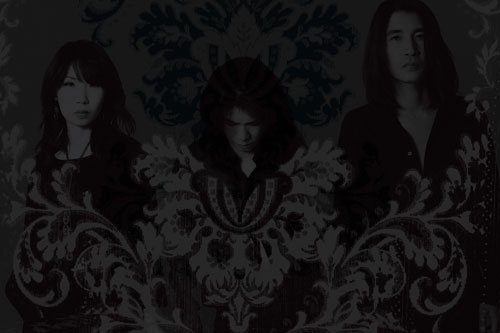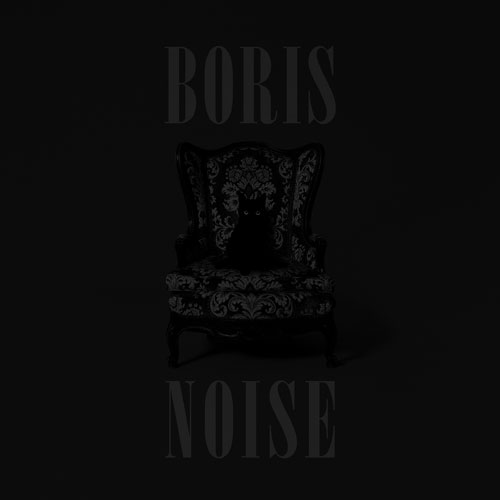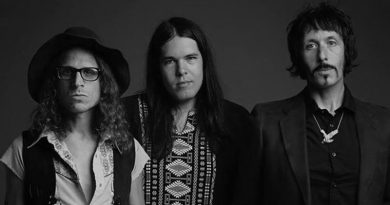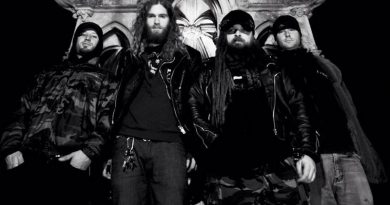Boris: Genre Defying Japanese ‘Rockers’ Are Quizzed By Stephen B Murray
It is a warm afternoon. Bright sunlight piles into the Lexington on Pentonville Road through large windows set in two adjacent walls. The pub is quiet, almost dead, save for the jukebox which crunches out some indie rock, presumably for the benefit of the largely untroubled barman. Last night Japanese rock nobility, Boris, headlined the Electric Ballroom and helped to bring Desertfest 2014 to a climactic close. They are now comfortably installed in a corner booth, and though coffee is laid before them, they appear fresh and alert, well-groomed and seemingly unburdened by the pitfalls traditionally associated with rock musicians on the road. Yet some other shadow is disquieting them.

“I hate cassette.”
The verdict is delivered slowly, unequivocally and in English. Up until now, Atsuo, Takeshi and, theoretically, Wata have had their words recast from their native Japanese to English by an interpreter provided for the interview. Though a wicked light is kindled in his eye and a broad grin splits his face, Atsuo means business. He returns to Japanese to explain why.
“I used to record using cassette tapes, but they damaged quickly. I hate that.”
The mention that the trend at the moment is very much in favour of releasing on tape is met with much laughter.
“I think artists releasing on cassette are quite egoistic; normally people don’t have a [cassette] player, but these artists want to release it in this way.”
But this is not to say that Atsuo’s opinion is polarised by the analogue-digital divide. When it comes to formats, Boris appear mainly concerned in adding value to their records, something they don’t feel can be done with CD-R releases and which they don’t feel they can do with cassette tapes.
“I hate that easy analogue stuff,” says Atsuo. He slips once more into broken English to add, “Cheap product,” whereas, “Vinyl pricey.”
Discussion breaks out between Atsuo and Takeshi. The interpreter jots a few notes.
“They were quite familiar with using cassette tapes in the real age of cassette tapes,” the interpreter reveals. “So at the moment, particularly in Japan, they believe that cassettes are a kind of tool for copying originals. That’s why they’re not into it.”
Takeshi elaborates. “It’s kind of a cultural difference from Europe and America. In Japan, we used to have cassette tapes just to copy from the original, not as the actual products. It’s quite different, the original stuff, if you use cassette tapes.”

When asked which format is best for listening to Boris, Atsuo makes no hesitation. “On the stage,” he says.
So do they try to capture that live sound in their studio recording?
“No. We’re not trying to do the same thing.”
Rather, he describes it as ‘translation’.
“There’s a different story with each medium. On CD you have one story, on vinyl you have a separate story. With different media you have different stories.” It is clear he is talking of tangible media, physical records which can be “part of [the listeners’] lives” and their own life story. He tells me that their label often bemoans the fact that their record sales exceed their digital sales which he says would be better for the label. “The fact is the physical stuff sells really well,” he laughs.
It would be interesting to know, then, what Atsuo thought a fair price for a music download would be.
“I have no idea because I’ve never bought one!” He smiles again before throwing the question back. “What do you think is the right price?”
Translation across media is not without it’s inaccuracies and moot points, however, and perhaps this is at the heart of Boris’s misgivings over the digital world.
“It’s painful, but at the same time useful. Sometimes the Internet makes some misunderstanding for Boris. There is a downside, but sometimes that downside can be good.” He describes it as the ‘error effect’: “Sometimes misunderstanding can have good effects.”

Pressed for an example, Atsuo inclines his head slightly and gazes off in thought briefly. An idea strikes. “People often describe Boris as heavy metal.” This appears to be a joke shared between the band before, and Boris, as one, laugh. “That’s quite a misunderstanding, but at the same time it has good effects for us. We never said we were metal, but that misunderstanding could be good for us. That kind of misunderstanding never makes us unhappy; it’s quite a good thing. That kind of misunderstanding led us to play Desertfest, so in the end it’s a really good thing.”
Mention of genre is unavoidable when talking of Boris, a band unbound by such considerations. Their many records display a range of stylistic influences and textures, though it would be fair to use the umbrella term ‘rock’. The new album, Noise, is such an example of genre defiance, blending joyous pop beats with ghostly lullabies, and heavy psych throatiness with soothing liqueur melody. Boris are aware that this approach has led to a subdivided fanbase.
“That’s right,” Atsuo agrees. “We believe that the fans who like metal pick up particular records and fans into other genres pick up other records. So those fans, metal fans for example, could go to other genres through Boris.”
Boris as a gateway band?
“Yes. We try to make many entrances to other genres.”
Translation of their latest material to a studio recording seems to have been one of the simplest. With Noise, Atsuo says, they were able to place on record eight tracks which are similar to their live song counterparts. Again, feeling compelled lest misunderstanding creep in, Atsuo crosses to English: “Same arrangement: recording, stage.” And as if to leave no doubt that the sonic world of Boris is far from static, he adds, “This time.”
Noise is set to be released on June 16th 2014 via Sargent House.
Band Links: Official | Facebook | Tumblr | Twitter
Interviewed by: Stephen B Murray
Photo Credit: Miki Matsushima



